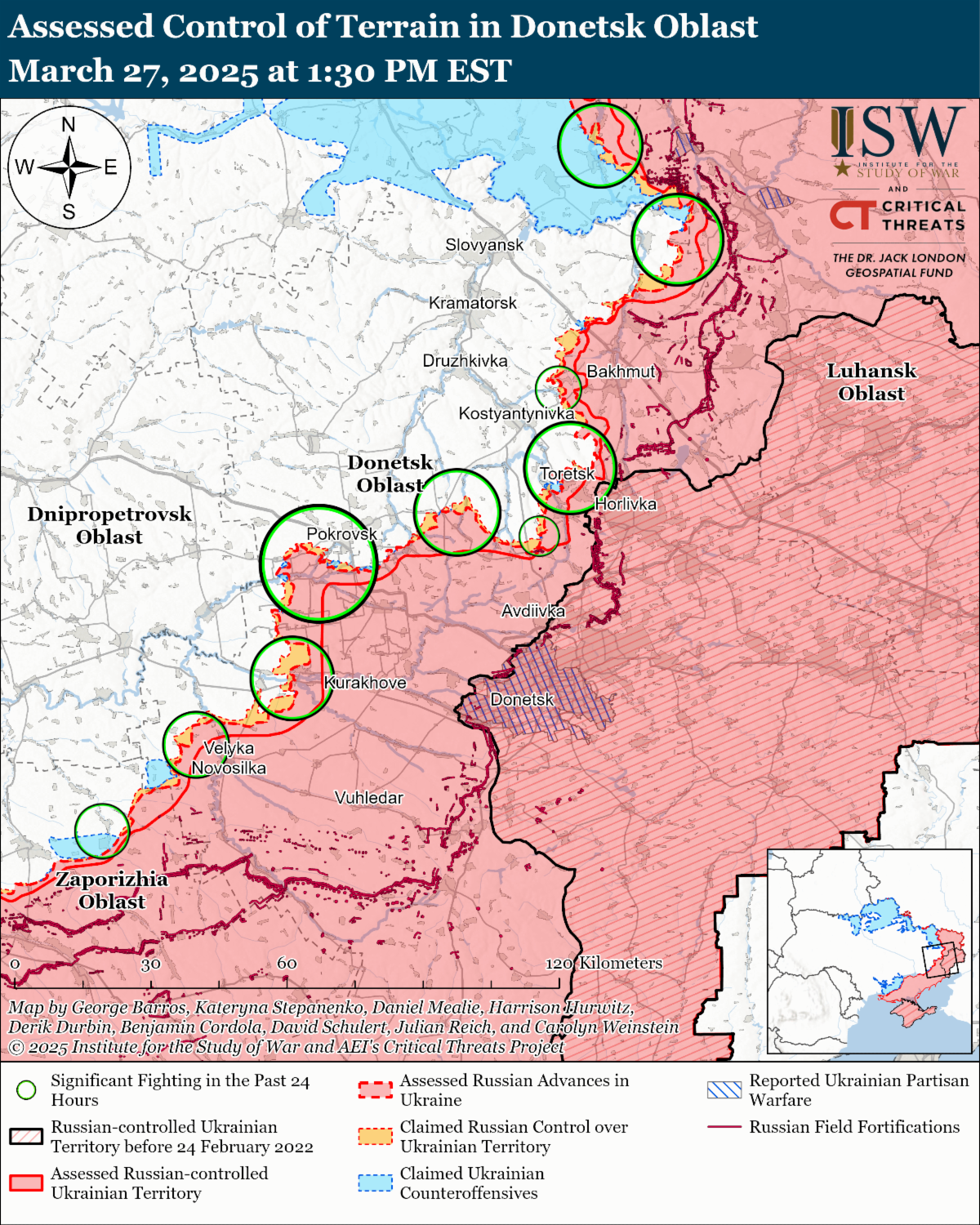Ukrainian President Volodymyr Zelensky reiterated on March 26 that discussions are ongoing about the details of the temporary ceasefire agreements on energy infrastructure strikes and maritime operations in the Black Sea. Zelensky stated on March 26 that Ukraine, the United States, and Russia must still resolve unspecified "technical" issues related to the temporary ceasefire agreements on energy infrastructure strikes and maritime operations in the Black Sea but did reach agreements on these ceasefires during talks in Saudi Arabia on March 24 and 25. Zelensky added that that the Ukrainian, US, and Russian technical teams have not yet determined the monitoring mechanisms for temporary ceasefires on energy infrastructure strikes and maritime operations in the Black Sea, which makes it difficult to assess Russia's compliance. Ukrainian Defense Minister Rustem Umerov stated on March 25 that Ukraine regards any movement of Russian military vessels outside of the eastern part of the Black Sea as a violation of the "commitment to ensure safe navigation of the Black Sea." The Kremlin, however, said on March 25 that it will not implement the agreed ceasefire in the Black Sea until the United States lifts sanctions on Russian state-owned agricultural bank Rosselkhozbank and other unspecified financial organizations involved in international food and fertilizer trade. US Secretary of State Marco Rubio acknowledged on March 26 that the European Union (EU) must be involved in lifting sanctions on Russia. European Commission Foreign Affairs Spokesperson Anitta Hipper stated on March 26 that the EU would consider lifting or amending sanctions against Russia only if Russia "end[s] its unprovoked aggression in Ukraine" and "unconditonal[ly] withdraw[s]" all Russian forces from Ukraine.
Russia continues to strike Ukrainian critical and civilian infrastructure under the cover of the ceasefire on energy infrastructure strikes — which is not in line with US President Donald Trump's goal of using the temporary ceasefire to facilitate a lasting peace in Ukraine. Ukrainian Ministry of Foreign Affairs (MFA) Spokesperson Heorhii Tykhyi stated on March 27 that neither Ukraine nor Russia struck each other's energy facilities since March 25, although the Russian Ministry of Defense (MoD) accused Ukraine of violating the ceasefire agreement on the nights of March 25 to 26 and 26 to 27. The temporary ceasefire does not include protections for civilian or non-energy critical infrastructure, and Russian forces have intensified strikes against these objects in recent days. The Ukrainian Air Force reported that on the night of March 26 to 27, Russian forces launched an Iskander-M ballistic missile from Voronezh Oblast and 86 Shahed and other drones from Kursk City; Millerovo, Rostov Oblast; Primorsko-Akhtarsk, Krasnodar Krai; and occupied Cape Chauda, Crimea. The Ukrainian Air Force reported Ukrainian forces downed 42 drones and that 26 drones were "lost," likely due to Ukrainian electronic warfare (EW) interference and Ukrainian officials reported that Russian strikes damaged civilian infrastructure in Dnipro, Sumy, and Kharkiv cities. Ukrainian Air Force Spokesperson Colonel Yuriy Ihnat stated on March 24 that Russia is intentionally targeting populated cities with drones in order to destroy infrastructure and terrorize the local civilian population. Russian forces have repeatedly conducted large strikes against civilian areas in Kryvyi Rih, Dnipropetrovsk Oblast; Dobropillya, Donetsk Oblast; and Zolochiv, Kharkiv Oblast and port infrastructure in Odesa City since early March 2025 amid discussions of a temporary ceasefire. The Trump administration has previously characterized a temporary general ceasefire (which Russian President Vladimir Putin has repeatedly rejected) as a "necessary step" toward achieving an enduring peace settlement. Continued Russian strikes on Ukraine's civilian infrastructure, even under the conditions of an alleged ceasefire on energy infrastructure strikes, will be detrimental to the establishment of a sustainable peace in Ukraine.
Key Takeaways:
- Ukrainian President Volodymyr Zelensky reiterated on March 26 that discussions are ongoing about the details of the temporary ceasefire agreements on energy infrastructure strikes and maritime operations in the Black Sea.
- Russia continues to strike Ukrainian critical and civilian infrastructure under the cover of the ceasefire on energy infrastructure strikes — which is not in line with US President Donald Trump's goal of using the temporary ceasefire to facilitate a lasting peace in Ukraine.
- The Ukrainian General Staff reported that the March 19 to 20 Ukrainian drone strike against Russia's Engels Airbase destroyed a large number of cruise missiles and strategic fuel reserves as Ukrainian officials reported that Russia is prioritizing the production of high-precision missiles.
- Ukrainian President Volodymyr Zelensky warned that Russia is preparing for a spring offensive in Sumy and Kharkiv oblasts.
- Ukraine's European allies met in Paris for a Coalition of the Willing summit on March 27 to discuss their ongoing support for Ukraine, a monitoring system to ensure ceasefire compliance, and the possible deployment of a "deterrent force" in Ukraine.
- Ukrainian forces recently advanced near Borova, Toretsk, Pokrovsk, and Kurakhove. Russian forces recently advanced in Kursk and Sumy oblasts; near Lyman, Toretsk, and Pokrovsk; and in western Zaporizhia Oblast.
- The Volunteer Society for Assistance to the Army, Aviation, and Navy of Russia (DOSAAF), which promotes patriotic and military education and has been involved in Russian volunteer recruitment efforts, elected Denis Dobraykov as the new DOSAAF Chairperson on March 27.
| 




 [ISW] 러시아의 공세 캠페인 평가, 2025년 3월 29일
[ISW] 러시아의 공세 캠페인 평가, 2025년 3월 29일
 [ISW] 이란 업데이트, 2025년 1월 27일
[ISW] 이란 업데이트, 2025년 1월 27일